Transcending the
Israel Lobby at Home and Abroad 2022
Website;
https://IsraelLobbyCon.org
Date: March 4, 2022
Venue: The National Press Club
Topics: How Americans are effectively working to
overcome Israel lobby demands to violate
international law, undermine freedom of speech,
reward Israeli militarism and denigrate peaceful
Palestinian aspirations. How voters this election
year can both support and field politicians and keep
them from succumbing to the lobby’s coordinated
campaign contributions and constant pressure for
fealty. Exploring important grassroots legislative
and legal battles won by peace and justice allies in
2019-2020, how they did it, and how you can, too.The
key differences between Jewish establishment Zionism
and Christian Zionism, and common
misunderstandings.How to implement emerging
“non-Israel-centric” regional strategies to
eliminate the crippling human and financial costs of
unending wars. |
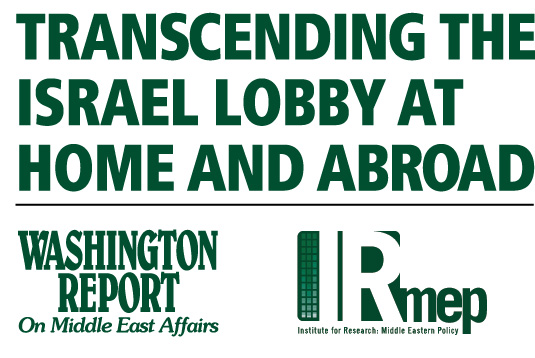 |
End US Support for Israeli Apartheid?
The 2021 virtual edition of the
IsraelLobbyCon annual series
Website:
https://www.IsraelApartheidCon.org
Dates: April 17 and 24,
2021
Venue: Online conference
Topics: While Congress wrangled over modest
emergency pandemic relief for Americans, the nation
of Israel receives $3.8 billion annually—and even
more covert aid—with barely a whisper of debate. Any
member of Congress who might question the annual
U.S. subsidy for Israeli militarization knows that
he or she will incur the wrath of AIPAC and other
Israel lobby groups. The lobby patrols the Congress
to ensure that Israel, a small country of some nine
million people, remains by far the largest recipient
of U.S. foreign assistance since World War II.,
U.S,. aid enables Israeli apartheid, new settlements
in illegally occupied territories and ongoing
violent repression of Palestinians. Meanwhile,
American citizens who question illegal Israeli
policies and engage in nonviolent protest movements
such as BDS (boycott, divestment and sanctions) are
accused of being anti-Semites, and their free speech
rights threatened.
This web-based conference considers whether the
United States should cut off aid to Israel or make
any such assistance conditional on negotiation of a
genuine peace settlement, respect for Palestinian
human rights, and adherence to international law.
Wrapping around the annual meeting of the Israel
lobby group J Street, the webinar will address U.S.
financial support of Israel, the strengths and
weaknesses of “liberal” lobby groups like J Street,
prospects for a one- or two-state solution, and the
progress of free speech organizations, the BDS
movement and other forms of resistance, including
solidarity between Palestinian activism and the
Black Lives Matter movement.
|
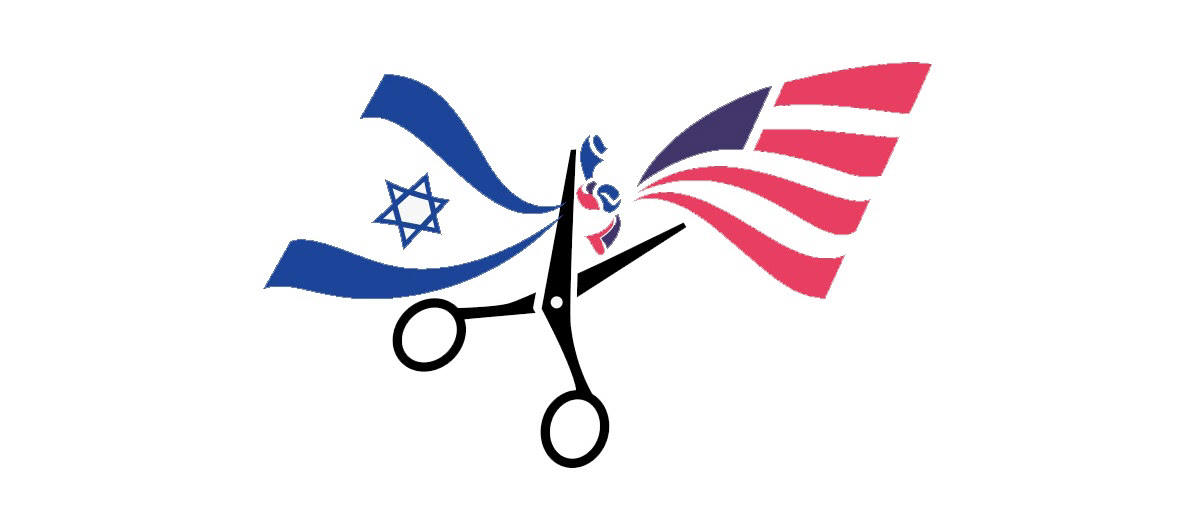 |
|
The
Israel Lobby & American Policy 2019
Website:
https://israellobbyandamericanpolicy.org
Date: March 22, 2019
Venue: The National Press Club
Topics: Experts will address the following questions: How
has the Israel lobby further captured key nodes of U.S.
government policymaking? Why is U.S. policy so expensive,
destructive and unrepresentative of the will of the American
people? How are a handful of politicians now successfully
running against previously unquestioned, longstanding Israel
lobby platforms? What rules do reporters follow when they
tell the truth about U.S. policy and the lobby? Why do U.S.
presidents sign secret letters promising not to publicly
discuss Israel’s clandestine nuclear weapons program? Why
does the U.S. give more foreign aid to Israel than to any
other country, and how is the makeup of that aid changing?
What, if anything, does the U.S. get out of its so-called
“special relationship” with Israel? How are human rights
groups working to “de-Israelize” state and local
governments? What is the Israel lobby doing to provoke an
armed U.S. confrontation with Iran? What else is the lobby
doing to improve Israel’s strategic position in the region?
Why are assertions that Israel and the U.S. have “shared
values” made, and are these assertions accurate?
|
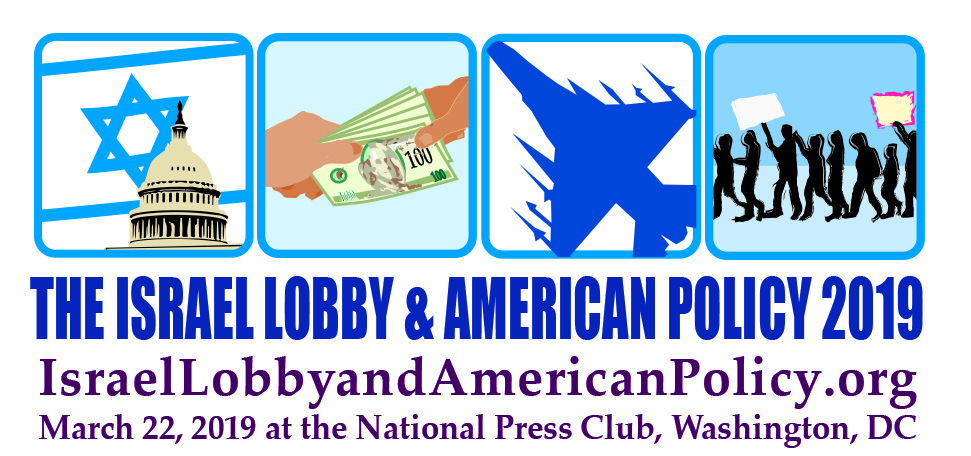 |
|
The
Israel Lobby & American Policy 2018
Website:
http://2018.israellobbyandamericanpolicy.org
Date: March 2, 2018
Venue: The National Press Club
Theme: Expert
speakers addressed the Israel lobby’s agenda, whether the
U.S. is supporting an apartheid state, how supporting
Israeli violations of international law impacts the U.S.,
the Anti-Semitism Awareness Act, Israel lobby suppression of
free speech and academic freedom on campus, how and when
Christian evangelicals became Zionists, Israeli societal
trends, the Palestinian BDS campaign, the impact of Russian
vs Israeli media and electoral influence, the trajectory of
the CIA/Mossad relationship and whether the U.S. can be
persuaded to attack Iran to advance Israel’s strategic
position.
|
 |
The
Israel Lobby And American Policy 2017
Website:
http://2017.israellobbyandamericanpolicy.org
Date: March 24, 2017
Venue: The National Press Club
Theme: Experts
spoke about US foreign aid to Israel, what has changed,
legislation against BDS, overcoming the Israel lobby in
Congress, a Palestinian perspective on the "peace process,"
the documentary film "Two Blue Lines," "strategies to push
back on Hollywood stereotypes," Israel lobby funding
Islamophobia, "fake" peace processing, viewing the
Israel-Palestine conflict through the lens of "settler
colonialism," and an undercover investigative journalism
series on covert Israel/lobby operations in the UK.
|
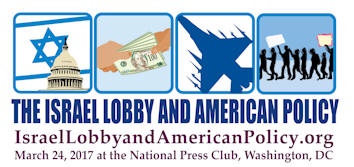 |
Israel's
Influence: Good or Bad for America?
Website:
http://IsraelsInfluence.org
Date: March 18, 2016
Venue: The National Press Club
Theme:
Expert panelists and keynote
speakers analyzed the enormous impact Israel’s influence
has on Congress, establishment media, academia and other
major institutions.
|
 |
The
Israel Lobby: Is It Good for the US? Is It Good for Israel?
Website:
http://IsraelLobbyUS.org
Date: April 10, 2015
Venue: The National Press Club
Theme:
This unprecedented gathering focused on the Israel lobby in
America. How big is it? How fast has it grown? How
interconnected are the organizations and individuals? How
much revenue does it raise and where does the money go? What
are the common objectives of the lobby? What laws apply to
lobbying to benefit a foreign government and are they
vigorously enforced? Do coordinated campaign contributions
cause American policymakers to act more on behalf of Israel
than the United States? What fallacies underlie the
assertions that U.S. and Israeli interests are the same?
What are the Israel lobby’s public and private,
short-and-medium-term policy objectives? And what can
Americans who do not believe pro-Israel slogans, activities
and policy objectives do?
|
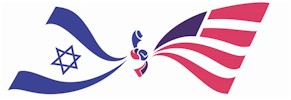 |
National Summit to Reassess the
U.S.-Israel "Special Relationship"
Website:
http://NatSummit.org
Date: March 7, 2014
Venue: The National Press Club
Theme: U.S. financial, military, and diplomatic
support for Israel has grown significantly and steadily
throughout the past 60 years and now dwarfs annual American
foreign assistance to all other nations.
Research indicates
the U.S.-Israel "special relationship" is a major factor in
foreign hostility towards Americans. Some experts suggest
that Israel has been central to U.S. wars in the Middle
East. However, the huge public backlash against Israel
lobby-generated momentum for U.S. attacks on Syria and Iran
indicates that Americans are concerned about the direction
of U.S. foreign policy, how it is made, and those trying to
make it. This historic summit will provide an in-depth,
multifaceted inquiry into this critical subject matter.
Panelists will include former military and diplomatic
personnel, intelligence officers, scholars, economists,
researchers and a variety of other subject-matter experts
and authors often shut out of key discussions in public
forums and news media outlets. Members of the public will be
allowed to ask the key questions and network with other
attendees.
|
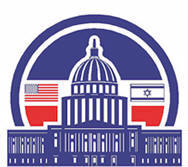 |
The
NUMEC Cover-up: The Diversion of U.S. Weapons Grade Uranium
from NUMEC to Israel
Website:
https://www.youtube.com/watch?v=MlPsC8sOmRA
Date: January 31, 2013
Venue: Parks Township Volunteer Fire Hall, just
outside Apollo, PA
Theme: Author Grant F. Smith discussed key findings from his
2012 book, Divert! NUMEC, Zalman Shapiro, and the
Diversion of US Weapons-Grade Uranium into the Israeli
Nuclear Weapons Program at the Parks Township Volunteer
Fire Hall.
Smith's talk covered the corporate histories of NUMEC and
Apollo Industries, how regulators dealt with the plant's
massive losses of bomb-grade nuclear material, the FBI's
investigation of NUMEC's joint venture with a front for
Israel's nuclear weapons program, and the ongoing
clandestine interactions of NUMEC executives with Israeli
intelligence and covert nuclear weapons program operatives.
Smith also unveiled a major new effort to declassify all
remaining CIA, NSA, Justice Department and National Security
Council files revealing how American presidents quietly
grappled with NUMEC as a proliferation and safeguards issue
from the LBJ to the Carter administrations. |
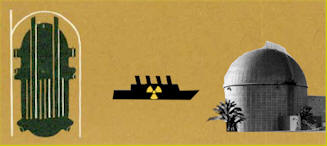 |
US-Israel
Trade: Espionage, Theft and Secret
Website:
https://vimeo.com/31298789
Date: April 6, 2011
Venue: University of Rochester
Theme: Using a slide show of declassified documents and
charts, Smith revealed how secret agreements and a joint
Israeli embassy/AIPAC covert operation undermined US
industries and the trade negotiating process. New
quantitative analysis and disclosures reveal the US-Israel
trade agreement is actually a $10 billion/year foreign aid
program. Smith also discusses how major omissions in Dan
Senor and Saul Singer's 2009 Council on Foreign Relations
book Start-up Nation: The Story of Israel's Economic Miracle
undermine their two major findings: that perpetual conflict
gives Israel a comparative advantage and that the US should
reinstate conscription in order to match Israel's
entrepreneurial output. |
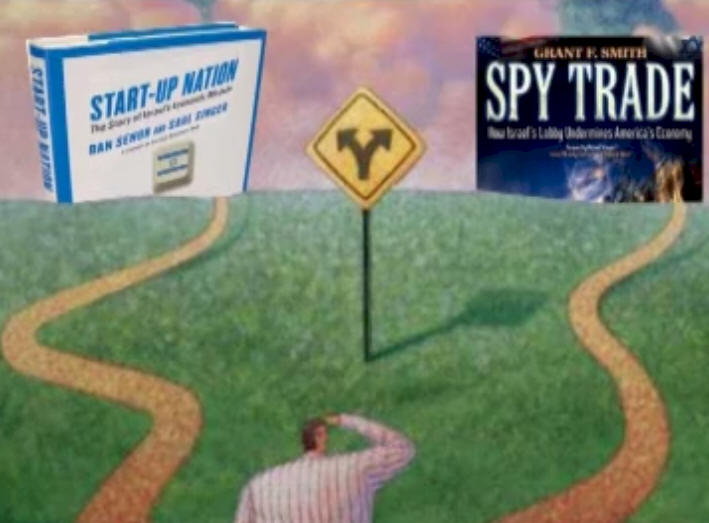 |
Israel's
Nuclear Arsenal: Espionage, Opacity and Future
Website:
https://archive.org/details/IsraelsNuclearArsenal-EspionageOpacityAndFuture-July72010Panel
and https://www.youtube.com/watch?v=3tG8ZkLYrd8
Date:July 7, 2010
Venue: The International Spy Museum
Theme:
What do newly declassified documents about weapons grade
uranium and dual-use technology diversions from the US
reveal about the role of espionage in building Israel's
secret arsenal? Did Israel's proposed nuclear weapons sales
to apartheid South Africa signal they are still for sale if
the partner and price are right? Do FBI and CIA cover-ups of
investigations into Israeli nuclear espionage signal
official US government approval or political acquiescence?
Did cooperating with Israel's policy of "strategic
ambiguity" ever make sense for the United States? Is the era
of 'nuclear opacity" now coming to an end? Are Israel's
nuclear weapons of strategic benefit to the US? John
Mearsheimer, Sasha Polokow Suransky and Grant F. Smith
tackled these questions. |
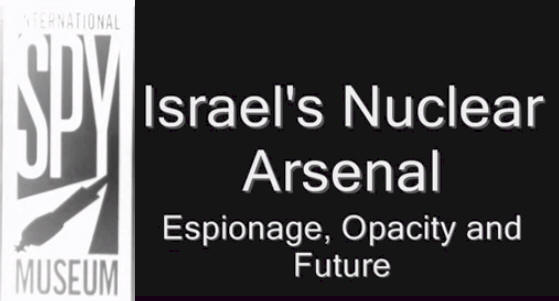 |
Neocon
Middle East Policy: The "Clean Break" Plan
Website:
http://www.c-span.org/video/?179299-1/us-middle-east-policy
Date:November 26, 2003
Venue: The Rayburn House
Office Building
Theme:"A Clean Break, A New Strategy for Securing the Realm"
is an ambitious 1996 Middle East policy paper. A Clean Break
recommended toppling the government of Iraq, "rolling back"
Syria and Iran, and "electrifying" support for Israel in the
US Congress in exchange for new missile defense contract
opportunities. Three of the eight authors have since become
prominent policymakers in the U.S. government. The study
leader, Richard Perle, is the former chair and a current
member of the Defense Policy Board of the Pentagon. Douglas
Feith is Undersecretary of Defense and David Wurmser is Vice
President Richard Cheney's recently hired Middle East
advisor.
But what is "A Clean Break?" What are the plan's core
assumptions? How has it affected US regional policy? What
insights does it reveal about US policy initiatives in the
Middle East? How do Arab countries perceive current US
regional policy? Are Clean Break assumptions and strategies
beneficial to US interests? What are the potential costs?
The IRmep Capitol Hill Forum took place on Wednesday,
November 26th 2003 from 10 a.m. to 12 noon in the Gold Room
of the Rayburn Congressional House Office Building. Our
distinguished and diverse panel of experts and IRmep
analysts reviewed the implications of A Clean Break and took
questions from the public. Panel members included Adam
Shapiro of the International Solidarity Movement, former
congressional candidate and Million Man March leader Dr. E.
Faye Williams, Muhammad Khaddam, First Secretary of the
Syrian Embassy; Khaled Dawoud, D.C. bureau chief of
Al-Ahram; and Adib Farha, adviser of the Lebanese Minister
of Finance and professor at the Lebanese American University
in Beirut, Lebanon. |
 |
|